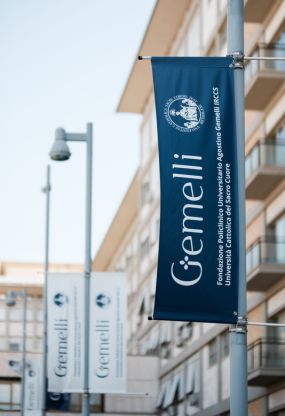Accredited School
Welcome to the Postgraduate School of Cardiovascular Diseases of the A. Gemelli Faculty of Medicine and Surgery on the Rome campus of Università Cattolica del Sacro Cuore
The Postgraduate School introduces itself
The educational objectives of the Postgraduate School of Cardiovascular Diseases are:
Basic objectives:
acquisition of fundamental knowledge of anatomical-physiology, biochemistry and genetics of the cardiac apparatus in order to establish the basis for learning the laboratory, clinic and cardiological therapy. The acquisition of the fundamental notions of mathematics, physics, statistics and computer science, useful for the understanding of the physiology of circulation and for the processing of data and images of clinical interest;
General training objectives:
acquisition of advanced knowledge of the etiopathogenic and pathophysiological mechanisms that determine the development of congenital and acquired heart diseases, as well as the main knowledge of epidemiology, semeiotics, clinical, instrumental and laboratory diagnostics applicable to cardiovascular diseases;
educational objectives of the type of School:
acquisition of fundamental theoretical and technical knowledge in all areas of non-invasive cardiology diagnostics (standard and dynamic electrocardiography, electrophysiology, one-dimensional, two-dimensional, Doppler and Color Doppler echocardiography, radioisotopic methods, CT, MRI) and invasive cardiology (coronary angiography, hemodynamic study, angioplasty, valvuloplasty, electrophysiology, cardiac electrostimulation) in adulthood and also pediatric, as well as the acquisition of theoretical and practical knowledge necessary for the prevention, diagnosis and therapy (pharmacological, interventional and surgical) of Diseases of the Cardiovascular System with particular regard to knowledge and behavioral methodologies in acute syndromes and in emergency-urgency situations.
The Postgraduate School of Cardiovascular Diseases lasts 4 years.
The School is located in the Department of Cardiovascular Sciences of the A. Gemelli University Hospital Foundation.
The number of students enrolled varies from year to year, according to ministerial provisions and any additional scholarships financed by the Regions or other public or private bodies.
The training program includes both theoretical and practical training. The school has a training network and training takes place at the Operating Units that are part of it.
In particular, the School:
I) ensure regular participation in care activities, including interdisciplinary ones, in order to ensure the acquisition of progressive and complete professional autonomy
II) guarantees the achievement of the standards of specialized instrumental procedures (non-invasive and invasive) provided for by the regulations of the specialization school
III) provides for continuous individual tutoring during clinical-care activities
IV) provides for the assignment of a training course tutor to be referred to throughout the duration of the specialisation school;
V) encourages participation in training events (Courses, Seminars, Congresses);
VI) provides for the realization of an experimental specialization thesis
VII) offers the possibility, from the first year of specialization school, to participate in the research activities of our Cardiology
VIII) allows postgraduate students who wish to do so to carry out training periods at other national and international structures of particular importance thanks to a wide network of inter-institutional collaboration
The following are compulsory professionalizing activities for the achievement of the educational purposes of the type:
- have personally followed at least 5000 cases of cardiovascular disease, at least 1500 of which in the Cardiology Intensive Care Unit, actively participating in the collection of anamnestic data, carrying out the objective examination, proposing the planning of diagnostic and therapeutic interventions (pharmacological, interventional and/or surgical), critically evaluating the clinical data;
- have clearly and competently presented at least 100 clinically paradigmatic cases of cardiovascular diseases at the formal meetings of the school;
- have performed and in any case personally reported at least 1000 standard electrocardiograms and 300 dynamic ECGs;
- have personally performed at least 350 provocative and/or pharmacological tests;
- have personally performed at least 500 one-dimensional, two-dimensional and Doppler echocardiograms with reporting;
- have personally performed at least 50 advanced echocardiographies (transesophageal echocardiography, 3D, strain analysis, etc.);
- have performed at least 50 epiaortic and peripheral vascular Doppler ultrasound;
- have demonstrated the ability to correctly recognize and interpret 150 radiograms, scintigraphy, CT and MRI related to cardiovascular disease;
- have participated in the execution of 30 right catheterizations, with calculation of the related hemodynamic parameters, and in 150 coronary angiographies and 100 angioplasty procedures;
- have participated in 120 PM/ICD implants (temporary and definitive), electrophysiological studies and transcatheter ablation with RF;
- have personally performed at least 100 PM/ICD programming;
- have acquired theoretical knowledge and clinical experience in the management of the acute patient and in cardiorespiratory resuscitation with an appropriate period of service in the Coronary and Cardiological Intensive Care Unit.
The Specialist in Diseases of the Cardiovascular System must have gained theoretical, scientific and professional knowledge in the field of pathophysiology, clinical and therapy of cardiovascular diseases, including congenital heart disease. Specific areas of expertise include the pathophysiology and clinical pathophysiology of the cardiovascular system, functional and instrumental semeiotics, clinical methodology, including behavioral methodologies in acute syndromes and in emergency-urgency situations, invasive and non-invasive instrumental diagnostics, pharmacological and interventional therapy, as well as primary prevention interventions and rehabilitation-occupational programs.
The School creates the right conditions for carrying out research activities, providing its resident physicians with the resources and tools necessary to carry out scientific research and encouraging scientific collaboration between subjects belonging to the academic community, facilitating the establishment of research groups and promoting the exchange of scholars with other Italian and foreign universities and scientific institutions.
- Participation in research projects and writing of scientific articles;
- Scientific and cultural training and collaboration with Italian and foreign institutions;
- Participation in national and international courses and congress events.
The School promotes and supports the internationalisation process through the mobility of postgraduate students, integrated study programmes, and inter-university cooperation initiatives for study and research activities. It collaborates with national and international bodies in the definition and implementation of scientific cooperation and training programmes.
- Internationalization: training periods abroad lasting a maximum of 18 months;
- Interregional projects: periods in extra-regional training network.
Read more
The School of Specialization in Cardiovascular Diseases of the Catholic University of the Sacred Heart boasts a long tradition of commitment to the training of young cardiologists, which began back in 1980, when the first schools of Cardiology came to life in Europe.
Over the decades, many professionals, many with subsequent brilliant careers at national and international level, have had the opportunity to develop their aptitudes in the clinical and scientific field of Cardiology within the training structure of our Postgraduate School. The teaching activities and most of the clinical activity of the Postgraduate School have always taken place at the Department of Cardiovascular Sciences of the A. Gemelli University Hospital Foundation. Furthermore, for some years now, our residents have also been able to make use of a Training Network that expands the clinical offer in a series of renowned national hospitals. Finally, thanks to the network of international relationships of our teachers, residents who express interest can carry out, mainly during the last year of the course, periods of completion of their training at the most important and cutting-edge National and International Cardiology Centers.
The four-year training program of our School is based on the completeness of exposure to all aspects of Cardiology through a system of rotations that are completed in the first three years. The last year is dedicated to the deepening of practice and knowledge in the field of cardiology (clinical, instrumental diagnostic, invasive) preferred by each resident. Such an organization allows our residents to systematically achieve the standards of specialized training required by national and international directives.
Alongside clinical professional growth, by tradition, our professors take care of the scientific growth of the residents with great enthusiasm, thanks to a tutoring system that allows them to be fully involved in the research activities of our Department and to create specialization theses that often become the subject not only of communications at the most important national and international congresses but also of publications in scientific journals equipped with High impact factor.
In conclusion, the School of Specialization in Cardiovascular Diseases is the pride of our Cardiology and we expect every year to have with us as residents young colleagues with the same passion for cardiovascular care and research.
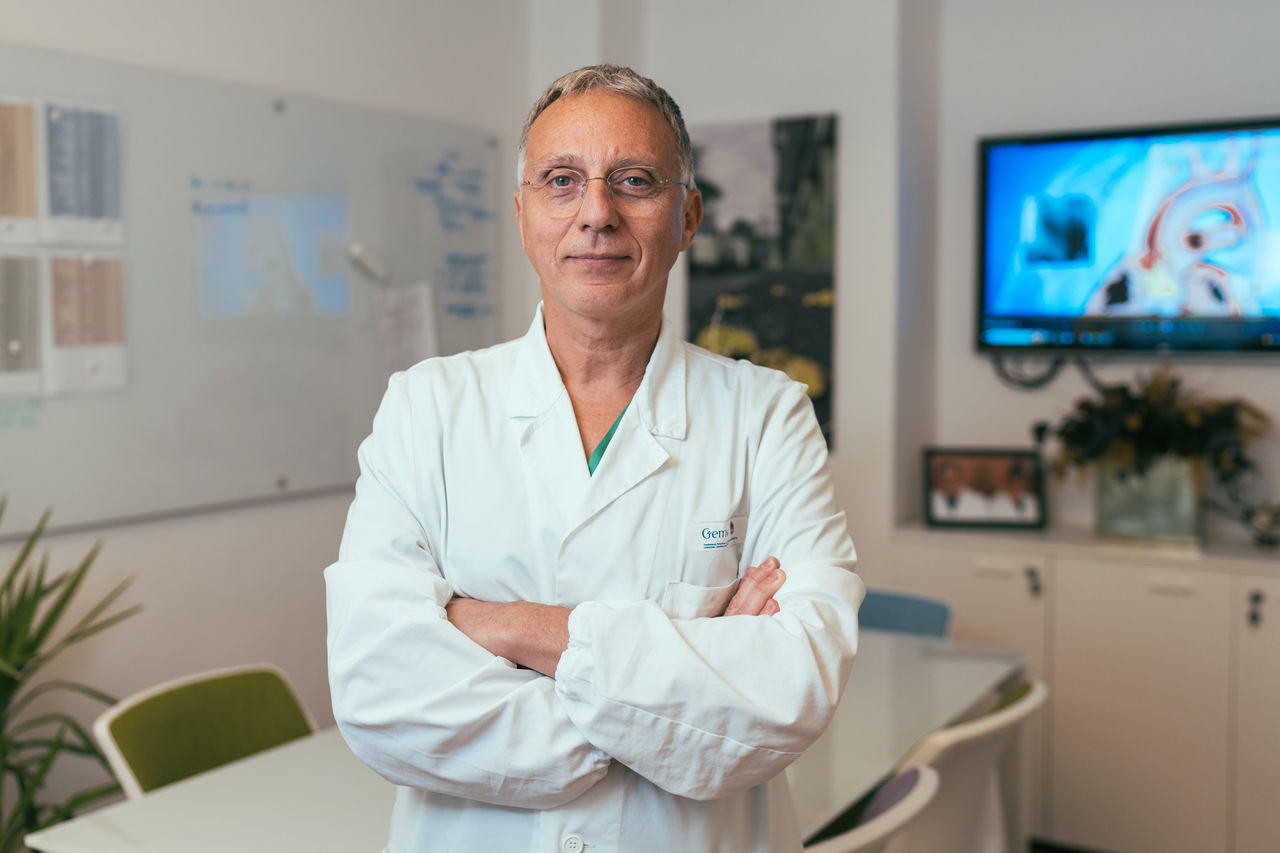 Prof. Francesco Burzotta - Director of the Postgraduate School of Cardiovascular Diseases
Prof. Francesco Burzotta - Director of the Postgraduate School of Cardiovascular Diseases
Director of the Postgraduate School of Cardiovascular Diseases at Università Cattolica del Sacro Cuore from 2002 to October 2023. Under your direction, 207 doctors specialized.
Prof. Filippo Crea was born in Cosenza on 19 September 1953 and graduated in Medicine and Surgery from the University and School of Advanced Studies of Pisa in 1977.
He obtained a specialization in Diseases of the Respiratory System and Tisiology in 1980 and in Diseases of the Cardiovascular System in 1983 at the University of Pisa.
In 1984 he was a Research Fellow at the Division of Cardiology at the University of Florida, directed by Prof. Richard C. Conti.
From 1985 to 1991 he worked at the Cardiovascular Research Unit of the Hammersmith Hospital in London, directed by Professor Attilio Maseri, first as Honorary Clinical Assistant and later as Senior Lecturer and Honorary Consultant.
In 1990 he became a Researcher at the Department of Internal Medicine of the Tor Vergata University of Rome.
In 1991 he moved as a researcher at the Institute of Cardiology of the Catholic University of the Sacred Heart in Rome.
In 2000 he became Associate Professor of Cardiology at the Institute of Cardiology of the Catholic University of the Sacred Heart.
On 1 January 2002, he was appointed Full Professor of Cardiology at Università Cattolica del Sacro Cuore, a position he held until 31 October 2023.
Since 2020 he has been Editor-in-Chief of the European Heart Journal, the official journal of the European Society of Cardiology.
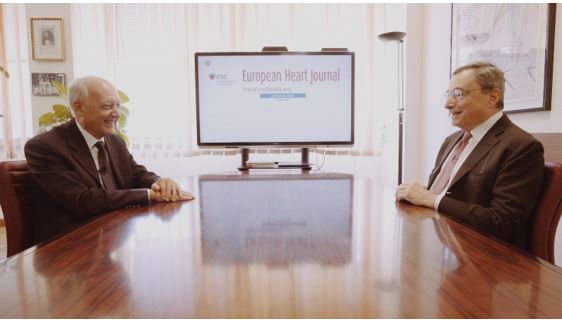 Prof. Filippo Crea interviews Prime Minister Mario Draghi (20/09/2020)
Prof. Filippo Crea interviews Prime Minister Mario Draghi (20/09/2020)
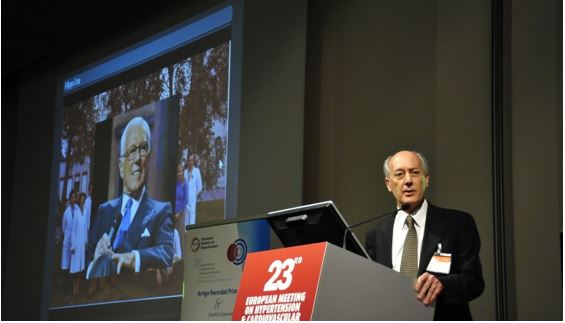 Prof. Filippo Crea during the award ceremony of the Arrigo Recordati International Prize for Scientific Research
Prof. Filippo Crea during the award ceremony of the Arrigo Recordati International Prize for Scientific Research
Director of the School of Specialisation in Cardiovascular Diseases at Università Cattolica del Sacro Cuore from 1990 to 2001. Under your direction, 101 doctors specialized.
Prof. Attilio Maseri was born in Pavia di Udine (UD) on 12 November 1935 and died in Tolmezzo (UD) on 3 September 2021.
He graduated in Padua in 1960 and specialized in Cardiology in Pisa in 1963 and in Nuclear Medicine in 1968. During his years of specialization, he was a Research Fellow at Columbia University in New York (1965) and Johns Hopkins University in Baltimore (1966) in the United States.
In 1967 he became Assistant in the Medical Clinic of the University of Pisa and head of the "coronary" research group of the Institute of Clinical Physiology of the CNR, directed by Professor Luigi Donato.
In 1979 he became Professor of Cardiovascular Medicine at the Royal Postgraduate Medical School of the University of London and Director of Cardiology at Hammersmith Hospital.
In 1991 he returned to Italy as Full Professor of Cardiology at the Catholic University of the Sacred Heart, where he remained until 2001.
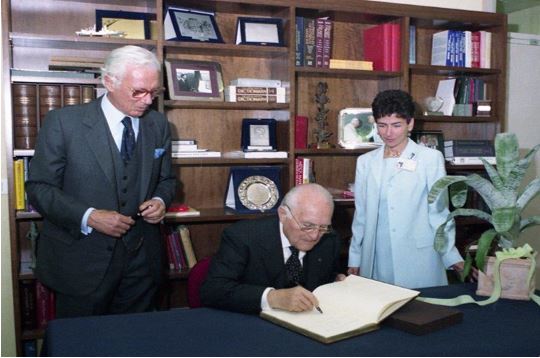 The President of the Republic Oscar Luigi Scalfaro inaugurates the "Coronary Research Center" directed by Prof. Attilio Maseri (26/03/1999)
The President of the Republic Oscar Luigi Scalfaro inaugurates the "Coronary Research Center" directed by Prof. Attilio Maseri (26/03/1999)
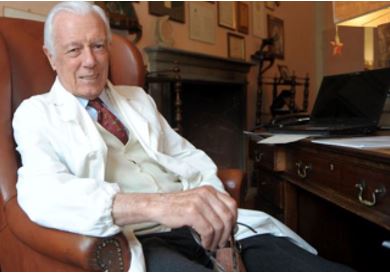 Prof. Attilio Maseri in his office
Prof. Attilio Maseri in his office
Director of the School of Specialisation in Cardiovascular Diseases at Università Cattolica del Sacro Cuore from 1980 to 1989. Under his direction, 136 doctors specialized.
Prof. Ugo Manzoli was born in Quistello, in the province of Mantua, on 30 October 1930 and died prematurely in Rome on 18 October 1989.
Graduated in Parma in 1955, he was "Fellow in Cardiology and in Peripheral Vascular Disease" at the General Hospital of Philadelphia (USA) in the years 1959-1960.
After a period in which he was Assistant Professor of Internal Medicine at the University of Ferrara, he became Associate Professor, first of Internal Medicine, in 1966, and then of Cardiology, in 1968, at the Catholic University of the Sacred Heart.
In 1976 he became Full Professor of Cardiology at the University of Catania.
In 1980 he was called to hold the chair of Full Professor of Cardiology at the Catholic University of the Sacred Heart.
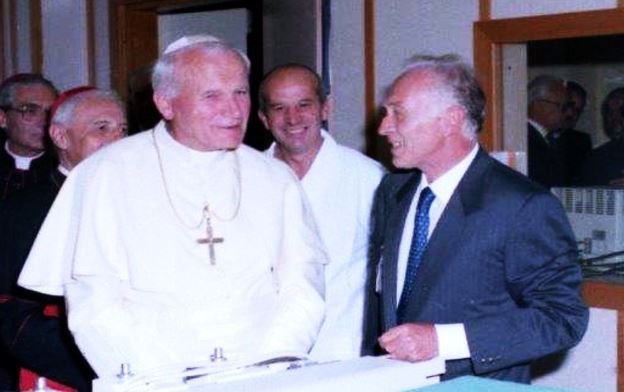 The Holy Father John Paul II inaugurates the Coronary Intensive Care Unit of the Agostino Gemelli Polyclinic directed by Prof. Ugo Manzoli (24/09/1988)
The Holy Father John Paul II inaugurates the Coronary Intensive Care Unit of the Agostino Gemelli Polyclinic directed by Prof. Ugo Manzoli (24/09/1988)
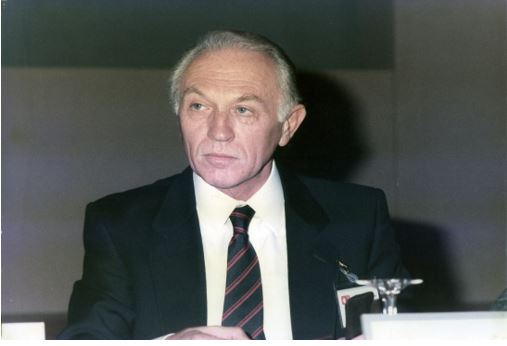 Prof. Ugo Manzoli at a moderation of the Congress of the Italian Society of Cardiology
Prof. Ugo Manzoli at a moderation of the Congress of the Italian Society of Cardiology




